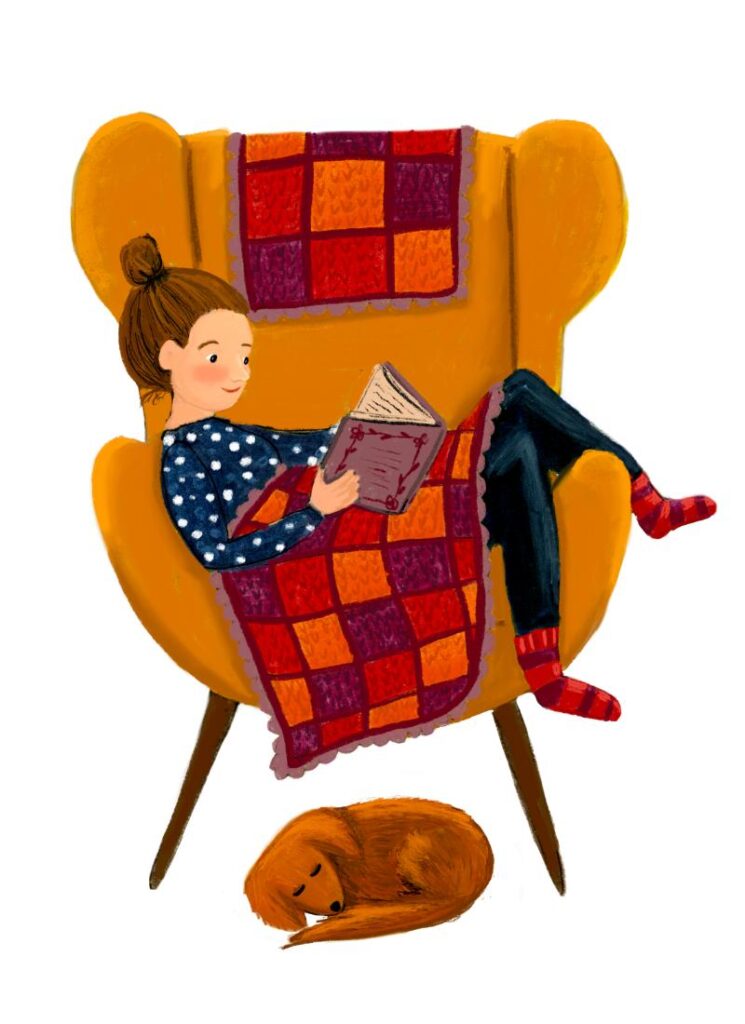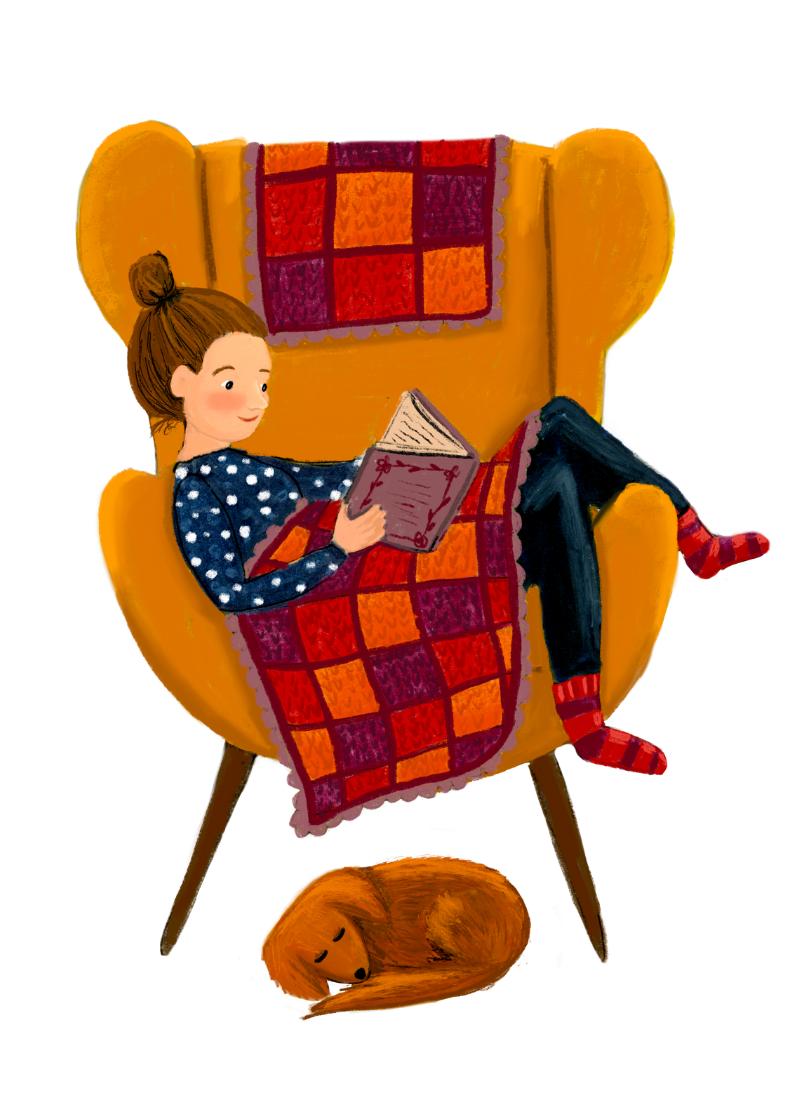Entrepreneurship with obstacles
As you may know, I am chronically ill. I have PTSD and a suspected brain injury after an accident. Not easy, not fun, but above all NOT the reason to make nothing more of my life. Because focusing on totally different things and especially things I can do has made my life much more fun. In this blog you can read all about entrepreneurship with obstacles.
Beginning matters - about 'growing into it', allowance and trials
I get a lot of questions about how I decided to start, whether I knew back then how many hours a day I could do something, how it affects my benefits and so on. To be nice and direct: I don't have an answer to this. I grew into it. I started painting for myself, but at a certain point I found it SO demotivating to immediately put the drawing that was finished in the cupboard behind me. Then I started my Etsy adventure. My first cards were a fat flop, but that did give me the opportunity to explore, practise and grow. In fact, that single order I received raised my stress level to the point where I would lie awake for nights until I got the package out the door, because 'IEW... I feel pressure, someone expects something from me, I 'have' to do something.... .panic! In hindsight, I'm glad I started so calmly and so could really grow into it. By now, I no longer experience stress at 20 open orders or a lost parcel (yes, that happens very occasionally). But what mental steps I had to make there!
The same goes for my benefits. I also found all that very stressing, but now I can let go of it completely and follow my own path. I do remember well the period when everything I did involved the UWV in the back of my mind... this took so much energy and is incredibly paralysing. It keeps the focus on being sick when you could benefit so much from shifting your focus to 'living'. I consciously worked hard on this and also turned a switch somewhere. I cannot spend the rest of my life dealing with the UWV and benefits, I also want to enjoy myself, see how far I can get and discover what is possible in this new life!
What can be done, thinking around
Exactly that, I think, has been the big turning point in my illness process. From being a broken bird on the couch, sad, panicking because nothing worked and I could no longer participate in 'normal' life, to being completely okay with how, what and who I am. For this, I first of all had to get to know myself, my limitations (with a lot of trial and error). That wasn't fun, but luckily there was help there. Once I started to understand what did and didn't work for me, I could focus more and more on 'what can be done'.
I think I spent about a year consciously looking at things in my life in a way in which things can be done (believe me, that gives a totally different energy than focusing on what cannot be done). It turned out I could paint for an hour or so, walking in a quiet place in nature calmed my system so that hiking (even if it's not long distances) became my new hobby, I was better off celebrating Christmas when my family came to our place so I didn't have to travel and could lie in bed in between, I could read children's books (and liked them a lot) while the complicated books I was used to reading were no longer possible.
You get it, I was reshaping my own life. I started liking it more and more, because how often do you get the chance to take a hard look at your life and completely arrange it the way it works for you!
To this day, I think in possibilities and solutions as much as possible, it has become a habit. And, looking at my business, one that is paying off! But it's not just thinking in possibilities it's also about choices.
Essentialism
Making choices about where to spend your energy. I have become quite rigorous about it (and I love it!) but I started with a lot of difficulty. I wanted to do everything, set high standards for myself, wanted to keep everyone friendly and not disappoint anyone of course. Unfortunately, that doesn't go hand in hand with taking good care of yourself, especially with a 'disability'.
I read a book on essentialism (well, I scanned it and picked out things that were relevant) and I suddenly understood what I had to do. What's funny is that in terms of character it's actually already all in me, one of my core values (you know them) is decisiveness!
Essentialism is about being able to distinguish between the 'vital few' and the 'trival many'. So you look very specifically at what is highest on your priority list for you. For instance, I look at what needs to be done each week and make a sorting in that. A lot of things can cost a lot of energy (like checking this text for spelling mistakes, which I don't do because that takes too much energy) while they deliver little or nothing. Around me, I see many creatives, freelancers and friends struggling with this. I choose the things that give me the most (also in terms of keeping balance of course, this is not just about business ;-)). So if it's good for me to spend an afternoon painting, that will be higher on the list than answering emails!
Working smart
For the past few years, I have been hovering over my diary like a madman, scrutinising my own thoughts just to discover where I could work smarter. Things that take far too much energy might not be necessary at all or could be easier (long live the day I bought a label printer and no longer had to copy addresses, which was mentally exhausting! Turned out I could suddenly pack twice as many orders, yes!). Other things I could maybe stop doing or just ask for help. For instance, I decided to ship with DHL because the parcel point is around the corner from where I live and I can take the dog there, so I can combine a walk with dropping off parcels.
For me, working smart includes making plans. After years, my energy level has finally stabilised, so I can finally make some plans. Each year, I look at which big projects I want to do, which last year were my picture book and the advent calendar, what else is necessary (e.g. a calendar or birthday calendar) and the rest are small projects that I do in between and don't plan.
This is my course and beyond that, my schedule is fluid (I follow my body). I get a lot of questions about how I deal with deadlines. Well, I give myself as few deadlines as possible! I'm well aware that this requires some discipline (which I possess quite a bit) so don't think now that this is the holy grail in terms of 'working with a disability'. And of course there are always 'some kind of' deadlines, but I make sure I plan everything super liberally and I generally finish a month before my own deadlines, lovely!
Daily schedule
Now zoom in, so I know my course, I also pretty much know what I want to do in the coming week and then it's a matter of smart planning and doing it! For example, I never plan doing administration on a day when I have a lot of orders to pack (administration can always wait), way too many stimuli! I alternate drawing (is relaxing) with work that my head has more trouble with (like answering e-mail). I rest from around 12 to 3pm every day, do nothing after 6pm and allow myself to start my day only after a cup of tea sometime between 9:30 and 10am. You guessed it, that doesn't leave much time! So in that time, I want to work as efficiently, purposefully as possible. I make a list of the things I want to do that day and determine their priority and get to work. But...
What if I have a bad day?
Well, nothing. If I really have to (and there's very little that really has to), I ask for help or see how I can solve something (you can also email customers that their order will be a day late or not promise anyone when your newsletter or blog comes online) and take my rest.
Things sometimes go wrong too
Well... I go over my limits sometimes too. It's in my character, I actually love to work hard, but I don't do it like I used to. So sometimes things go wrong. Whereas I used to get very angry with myself that I had 'done it wrong' or 'it's my own fault', these days I find it easier. I shrug my shoulders, clear my diary (as far as it was already full) and start taking care of myself (and often paint, that's where all those cards come from ;-)). It's all part of the job! And of course, sometimes I experience stress about a long list of orders that still have to be packed or an exploding mailbox. But even here I always find a solution!
Building self-confidence
Slowly but surely, I learnt to trust myself. That it is totally okay to be yourself and that it is okay to express that! I also find it super nice to have taken my focus off being sick, it has really become an afterthought. Living my passion is much more important and fun now. It may not be much in other people's eyes, or it doesn't represent my 'business', but for me it is super important a big part of my life's happiness and it gives me a sense of 'participating' even though I do almost everything in pyjamas 😉


Wonderful piece. Everyone is allowed to participate, right? Which clothes you prefer to participate in is up to you.
I enjoy your work immensely and get a lot of inspiration from it for my own little paintings.
Thank you.
Had no idea about your 'disability', nice that you have learned to take good care of yourself (recognisable, they could have devoted a lesson to it in school).